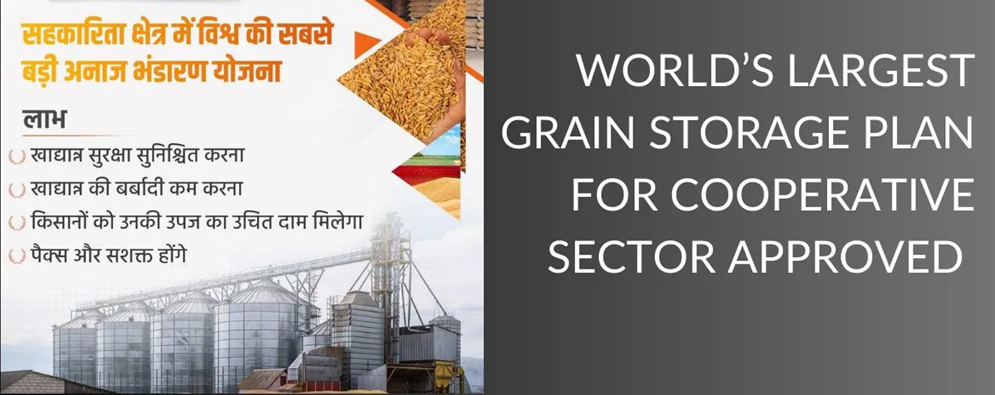Description

Copyright infringement not intended
Context: The Union Cabinet recently approved the constitution of an Inter-Ministerial Committee (IMC) to facilitate the “world’s largest grain storage plan in the cooperative sector”. This is a significant step towards enhancing the food security and agricultural development of the country.
Details
Objectives
- The main objective of this plan is to create adequate and modern storage infrastructure for grains and other agricultural products at the level of Primary Agricultural Credit Societies (PACS). PACS are cooperative societies that provide credit and other services to farmers. By creating godowns, cold storages, processing units, etc. at PACS, the plan aims to:
- Reduce post-harvest losses and wastage of grains
- Increase farmers' income and bargaining power
- Ensure timely availability and distribution of food grains
- Promote value addition and processing of agricultural produce
- Strengthen the cooperative sector and rural economy

Implementation
- The plan will be implemented by converging various schemes of three ministries: the Ministry of Agriculture and Farmers Welfare, the Ministry of Consumer Affairs, Food and Public Distribution and the Ministry of Food Processing Industries.
- An Inter-Ministerial Committee (IMC) will be constituted under the chairmanship of the Minister of Cooperation, with ministers and secretaries of the concerned ministries as members.
- The IMC will have the power to modify the guidelines and implementation methodologies of the schemes as and when needed, within the approved outlays and prescribed goals.
The plan will be executed by utilizing the available funds under the identified schemes of the respective ministries. Some of the schemes that have been identified for convergence are:
- Agriculture Infrastructure Fund (AIF)
- Agricultural Marketing Infrastructure Scheme (AMI)
- Mission for Integrated Development of Horticulture (MIDH)
- Sub Mission on Agricultural Mechanization (SMAM)
- Pradhan Mantri Formalization of Micro Food Processing Enterprises Scheme (PMFME)
- Pradhan Mantri Kisan Sampada Yojana (PMKSY)
- Allocation of food grains under the National Food Security Act
- Procurement operations at Minimum Support Price
The Ministry of Cooperation will implement a pilot project in at least 10 selected districts of different states/UTs in the country to ensure time-bound and uniform implementation of the plan in a professional manner. The pilot project will provide valuable insights into the regional requirements of the project, which will be incorporated for the country-wide implementation.
The plan is expected to bring multiple benefits for the farmers, consumers and the nation as a whole. Some of the benefits are:
- It will address the shortage of agricultural storage infrastructure in the country, which is estimated to be around 100 million tonnes.
- It will reduce the dependence on private warehouses and intermediaries, which often charge high rents and commissions from farmers.
- It will enable PACS to function as procurement centres for state agencies and the Food Corporation of India (FCI), thereby ensuring remunerative prices for farmers.
- It will also enable PACS to serve as fair-price shops for the distribution of food grains under the National Food Security Act, thereby ensuring food security for the poor.
- It will facilitate value addition and processing of agricultural produce at the PACS level, thereby creating employment opportunities and enhancing farmers' income.
- It will promote diversification and modernization of agriculture by providing facilities for the storage and processing of horticultural crops, dairy products, fishery products, etc.
- It will strengthen the cooperative sector and rural economy by empowering PACS with financial and managerial autonomy.

Conclusion
- The “world’s largest grain storage plan in the cooperative sector” is a visionary initiative that will transform the agricultural sector and food system of India. It will create a robust network of storage infrastructure at the PACS level, which will benefit millions of farmers and consumers. It will also boost the cooperative movement and rural development in India.
Must Read Articles:
World's Largest Grain Storage Plan in Cooperative Sector: https://www.iasgyan.in/daily-current-affairs/worlds-largest-grain-storage-plan-in-cooperative-sector
|
PRACTICE QUESTION
Q. India is one of the largest producers and consumers of grains in the world, but it also faces significant challenges in ensuring food security and reducing post-harvest losses. One of the key issues is the lack of adequate and modern grain storage facilities. How can India address this gap and expand its grain storage capacity to meet the growing demand and reduce wastage? What are the benefits and challenges of investing in grain storage infrastructure?
|
https://indianexpress.com/article/explained/what-is-the-massive-grain-storage-plan-the-govt-has-unveiled-how-itll-help-farmers-8663378/













